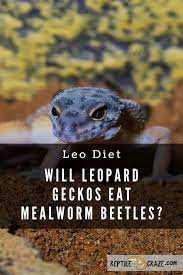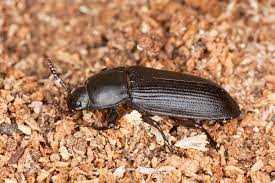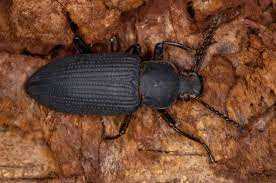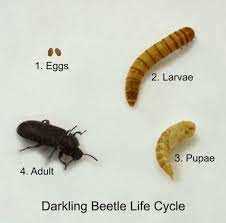
Mealworm beetles are the adult stage of mealworms, which are widely used as a staple food for leopard geckos. These beetles are dark brown or black in color and have a hard exoskeleton. While leopard geckos primarily feed on mealworm larvae, they can also be given a small number of mealworm beetles as a treat.
Feeding Habits

It is essential to properly gut load the insects before feeding them to the leopard geckos. Gut loading involves feeding the insects a nutritious diet to ensure they contain sufficient nutrients for the geckos. This practice helps ensure a well-balanced diet for the leopard geckos and promotes their overall health.
Mealworm Beetles
Mealworm beetles, also called darkling beetles, are the mature form of mealworms. While leopard geckos can eat mealworms, it is generally recommended to avoid feeding them the beetles. Mealworm beetles have a harder exoskeleton compared to mealworm larvae, and their bodies contain higher levels of chitin. Chitin is a polysaccharide found in the exoskeleton and can be difficult for leopard geckos to digest.
Feeding leopard geckos mealworm beetles can potentially lead to health issues, such as impaction. Impaction occurs when undigested food or substrate builds up in the digestive system, causing blockages. This can be dangerous and even fatal for leopard geckos. Therefore, it is best to stick to feeding them mealworm larvae rather than the beetles.
Dietary Variation
While mealworms can be a part of a leopard gecko’s diet, it is crucial to provide variety in their meals. Feeding only one type of insect, such as mealworms, can lead to nutritional deficiencies. To ensure a balanced diet, it is recommended to offer a mix of different insect species, such as crickets, waxworms, and roaches.
Additionally, it is beneficial to occasionally provide leopard geckos with small amounts of calcium and vitamin supplements. These supplements can help prevent issues related to calcium deficiency, such as metabolic bone disease. However, it is essential to use these supplements as directed and not to over-supplement, as this can also have negative effects on the gecko’s health.
Importance of a Balanced Diet

Additionally, offering occasional fruits, such as mashed bananas or pureed pumpkin, can provide some added variety to their diet. However, fruits should be given in moderation as a treat, and should not be the main component of their diet.
What Do Leopard Geckos Eat in the Wild?
Leopard geckos are native to the arid regions of Afghanistan, Iran, Pakistan, and India. In the wild, their diet consists mainly of insects, including beetles, crickets, grasshoppers, and spiders. These small creatures provide the necessary protein and nutrients that leopard geckos require to survive and thrive.
Beetles are a natural part of leopard geckos’ diet. They are an excellent source of protein and have a crunchy exoskeleton that helps promote healthy digestion. Mealworm beetles, in particular, are a common food source for leopard geckos in the wild. The beetles are rich in essential nutrients like calcium, which is important for the geckos’ bone and egg development.
In addition to beetles, leopard geckos also consume other types of insects. Crickets are a staple food because they are easy to find and are readily available in pet stores. Grasshoppers and spiders are occasional treats that provide variety in the geckos’ diet.
Overall, the wild diet of leopard geckos includes beetles, crickets, grasshoppers, and spiders, among other insects. These foods provide the necessary nutrition for their growth, development, and overall health.
Can Leopard Geckos Eat Mealworms?
While mealworms can be offered as part of a leopard gecko’s diet, they should not be the sole or primary source of food. Mealworms have a high fat content and are not as nutritionally complete as some other insects. Feeding leopard geckos a diet that consists mainly of mealworms can lead to health issues, such as vitamin and mineral deficiencies.
Benefits of Feeding Mealworms to Leopard Geckos
Although mealworms should not be the main component of a leopard gecko’s diet, they can still be beneficial in moderation. Mealworms are a good source of protein, which is essential for the growth and development of leopard geckos. They also provide a crunchy texture that can help promote dental health by keeping their teeth clean and trimmed.
Considerations and Risks
Another consideration is the size of the mealworms. Leopard geckos should only be fed appropriately sized mealworms to prevent choking. As a general rule, the size of the mealworm should not be larger than the space between the gecko’s eyes.
Feeding Recommendations
By providing a varied and balanced diet, leopard gecko owners can help ensure their geckos receive all the essential nutrients they need to thrive. Remember to consult with a veterinarian or reptile specialist for specific dietary recommendations and guidelines for your leopard gecko.
Are Mealworm Beetles Safe for Leopard Geckos?
Mealworm beetles are the adult form of mealworms. They have a hard exoskeleton and a different nutritional profile compared to their larvae counterparts. Many leopard gecko owners wonder if it is safe for their pets to consume mealworm beetles.
The Nutritional Value of Mealworm Beetles
However, if you have a colony of mealworms and some of them have already transformed into beetles, you can still feed them to your leopard gecko occasionally. Just ensure that this is not their main source of food and that you provide them with other insects to ensure a balanced diet.
Feeding Mealworm Beetles to Leopard Geckos
If you decide to offer mealworm beetles to your leopard gecko, it is essential to monitor their consumption. Some geckos may not find the beetles appealing or may have difficulty catching and eating them due to their hard exoskeleton. In such cases, it is best to remove the uneaten beetles from the enclosure to prevent any health issues.
Additionally, it is crucial to ensure that the mealworm beetles are gut-loaded before feeding them to your leopard gecko. Gut-loading refers to feeding the insects with nutritious food before offering them to your pet. This helps ensure that your gecko receives the necessary nutrients when consuming the beetles.
Conclusion
Potential Health Risks of Leopard Geckos Eating Mealworm Beetles
While mealworms themselves are a staple food for leopard geckos, their adult form, the mealworm beetles, may not be suitable for regular consumption. Mealworm beetles are larger and tougher than mealworm larvae, making them more difficult for geckos to digest. This can lead to gastrointestinal issues and possible blockages in their digestive system.
In addition, mealworm beetles have been known to carry parasites. These parasites can be transferred to leopard geckos through ingestion, potentially causing infections and other health issues. It is crucial to source mealworms from reputable suppliers and ensure they are properly gut-loaded and treated to minimize the risk of parasite transmission.
While the occasional consumption of mealworm beetles may not cause immediate harm to leopard geckos, it is best to offer them as occasional treats rather than a regular part of their diet. It is also important to provide a balanced and varied diet for optimal health.
Feeding Recommendations
Frequency of Feeding
Supplementing the Diet


I’m Lena Adams—a product of an unconventional upbringing in the African wilderness. My father, a daring explorer of African wildlife, sparked my fascination with reptiles, a passion that intertwined with the tragic loss of my mother during an expedition, leaving an indelible mark on my life. Driven to understand the creatures that captivated my parents, I embarked on my journey, sharing insights about reptiles, frogs, and lizards on my website. Through my explorations and conservation efforts, I honour my family’s legacy while seeking connections—to the creatures, nature, and the mother whose presence I yearn to understand.
